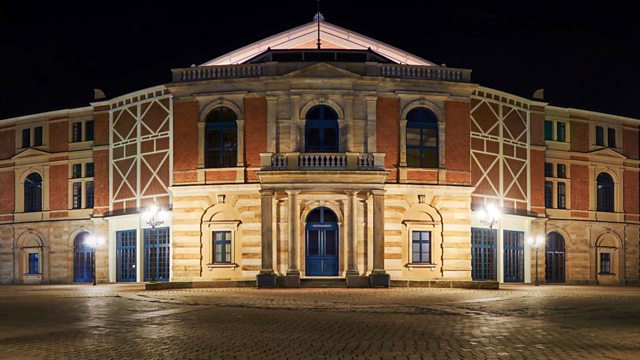
Wagner's Tannh├Ąuser
Stephen Gould and Lise Davidsen star in a performance from the 2021 Bayreuth Festival of Wagner's medieval story of love and passion among knights and goddesses.
In typical Wagnerian fashion, themes of love, death and myth combine in a music drama set in 13th-century Germany.
Stephen Gould plays Tannh├Ąuser, a medieval musician torn between passion and true love, who returns from the domain of the goddess Venus to the earthly land of Wartburg to try to win the affections of the devoutly religious Elisabeth - sung in this production by Lise Davidsen. Tannh├Ąuser's skill at a singing contest, which gets out of hand, aren't enough to win over her uncle, the local Count. So Tannhauser offers to seek forgiveness in Rome for his past transgressions - but his absolution is refused...
This performance of Tannhauser was recorded in July 2021 at the Bayreuth Festival, the annual event founded by and dedicated to Wagner. It's presented by Kate Molleson with expert commentary from music historian Dr Barbara Eichner.
Wagner: Tannh├Ąuser
Tannh├Ąuser ..... Stephen Gould (tenor)
Venus ..... Ekaterina Gubanova (mezzo-soprano)
Elisabeth ..... Lise Davidsen (soprano)
Count Hermann, her uncle ..... G├╝nther Groissb├Âck (bass)
Wolfram, Tannh├Ąuser's friend ..... Markus Eiche (baritone)
Biterolf, minstrel ..... Ólafur Kjartan Sigurðarson (bass)
Heinrich ..... Jorge Rodr├şguez-Norton (tenor)
Reinmar ..... Wilhelm Schwinghammer, (bass)
Young Shepherd ..... Katharina Konradi (soprano)
Bayreuth Festival Chorus and Orchestra
Axel Kober (conductor)
Last on
More episodes
Previous
Music Played
-
![]()
Richard Wagner
Tannhauser (Act 1)
Singer: Stephen Gould. Singer: Ekaterina Gubanova. Singer: Lise Davidsen. Singer: G├╝nther Groissb├Âck. Singer: Markus Eiche. Singer: Olafur Kjartan Sigurdarson. Singer: Jorge Rodriguez-Norton. Singer: Wilhelm Schwinghammer. Singer: Katharina Konradi. Choir: Chor der Bayreuther Festspiele. Conductor: Axel Kober. Orchestra: Bayreuth Festival Orchestra. -
![]()
Richard Wagner
Tannhauser (Act 2)
Singer: Stephen Gould. Singer: Ekaterina Gubanova. Singer: Lise Davidsen. Singer: G├╝nther Groissb├Âck. Singer: Markus Eiche. Singer: Olafur Kjartan Sigurdarson. Singer: Jorge Rodriguez-Norton. Singer: Wilhelm Schwinghammer. Singer: Katharina Konradi. Choir: Chor der Bayreuther Festspiele. Conductor: Axel Kober. Orchestra: Bayreuth Festival Orchestra. -
![]()
Richard Wagner
Tannhauser (Act 3)
Singer: Stephen Gould. Singer: Ekaterina Gubanova. Singer: Lise Davidsen. Singer: G├╝nther Groissb├Âck. Singer: Markus Eiche. Singer: Olafur Kjartan Sigurdarson. Singer: Jorge Rodriguez-Norton. Singer: Wilhelm Schwinghammer. Singer: Katharina Konradi. Choir: Chor der Bayreuther Festspiele. Conductor: Axel Kober. Orchestra: Bayreuth Festival Orchestra. -
![]()
Franz Liszt
Canzonetta del Salvator Rosa (Ann├ęes de p├Ęlerinage II)
Performer: Ll┼Ěr Williams.- Liszt: Piano Works: Llyr Williams.
- Signum Classics.
SYNOPSIS
(Scene: Medieval Germany - Wartburg Castle and surrounding area)┬áTannh├Ąuser, a minnesinger (courtly German lyric poet or singer), has spent a year in the magical underground realm of Venus.┬á He sings his praise of Venus but, to her surprise, expresses his desire to return to the human world.┬á Venus offers even greater pleasure if he┬áshould stay, but┬áTannh├Ąuser┬árepeats his longing for salvation and┬áis angrily dismissed.┬á His hope, he now cries, is with the Virgin Mary.┬á┬á
Suddenly,┬áTannh├Ąuser┬áarrives at a shrine close to Wartburg Castle.┬á A group of pilgrims passes through, bound for Rome, prompting┬áTannh├Ąuser┬áto sing God's praises.┬á Horns announce the arrival of Landgrave Hermann (a local prince) and his knights who are out hunting.┬á The group fondly remembers┬áTannh├Ąuser┬áand try to persuade him to go back to the castle with them.┬á┬áTannh├Ąuser┬áeventually agrees following the mention of the Landgrave's niece, Elisabeth, who had previously fallen in love at the sound of his singing.┬á┬á
ACT II
Another minnesinger, Wolfram, leads Elisabeth into Wartburg Castle's song hall.┬á She has not been inside since┬áTannh├Ąuser┬ádeparted and describes her suffering during his time away.┬á Tannh├Ąuser and Elisabeth sing together in praise of love and Wolfram, who also has feelings for Elisabeth, realises his love for her won't be reciprocated.┬á┬á
The song contest, which is on the subject of love, is declared open with Elisabeth's hand in marriage the prize.┬á Wolfram opens the competition singing of the beauty of virtuous love, only for┬áTannh├Ąuser┬áto burst into song about his own sensuous views of love.┬á At this Elisabeth must save him from the swords of the angry knights and the Landgrave decrees that┬áTannh├Ąuser┬ácan only be forgiven and allowed Elisabeth's hand in mariage if he joins the pilgrims in journeying to Rome to seek absolution.┬á┬á
ACT III   
Several months have passed and Wolfram has found Elisabeth praying at the shrine for┬áTannh├Ąuser's safe return.┬á A group of pilgrims goes past, but her love is not with them.┬á Elisabeth, returning to the castle, prays that her soul will be taken to heaven.┬á A ragged and weary┬áTannh├Ąuser appears later that evening, but his forgiveness has not been granted.┬á He explains to Wolfram that he would only be pardoned if the Pope's staff sprouted flowers.┬á The hopeless┬áTannh├Ąuser┬ásummons Venus, but as she appears so does Elisabeth's funeral procession.┬á Venus vanishes as┬áTannh├Ąuser┬ákneels in prayer, asking Elisabeth to in turn pray for him in heaven, before collapsing dead himself.┬á As dawn breaks, a young group of pilgrims arrive describing a miracle: they are carrying the Pope's staff, which has blossomed.┬á┬á
Broadcast
- Sat 30 Oct 2021 18:30┬ÚÂ╣ď╝┼─ Radio 3

